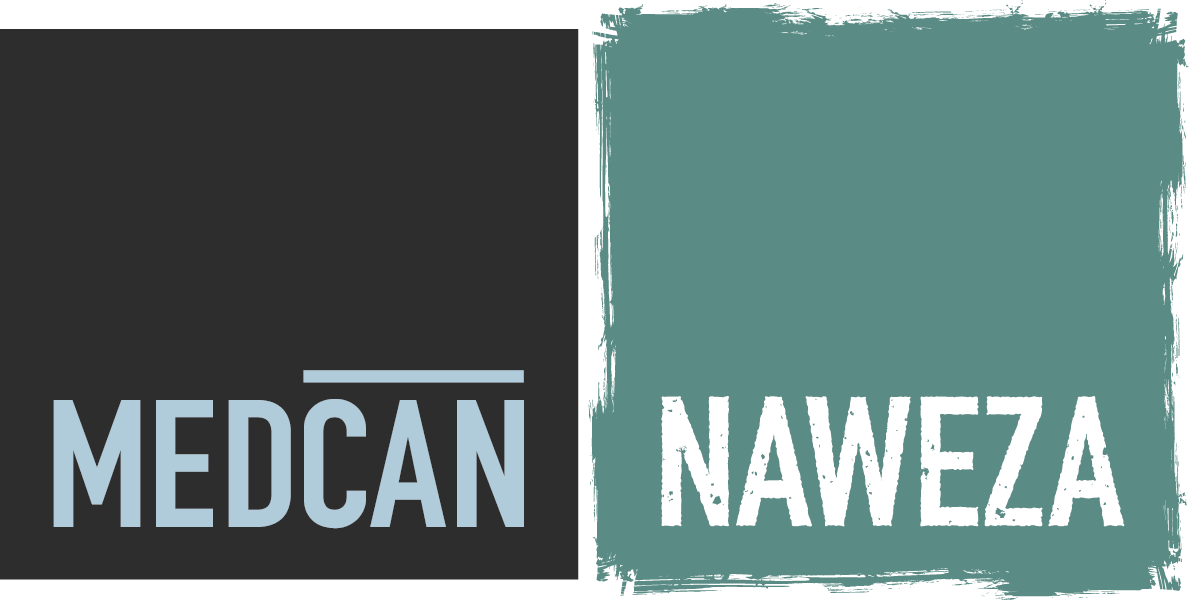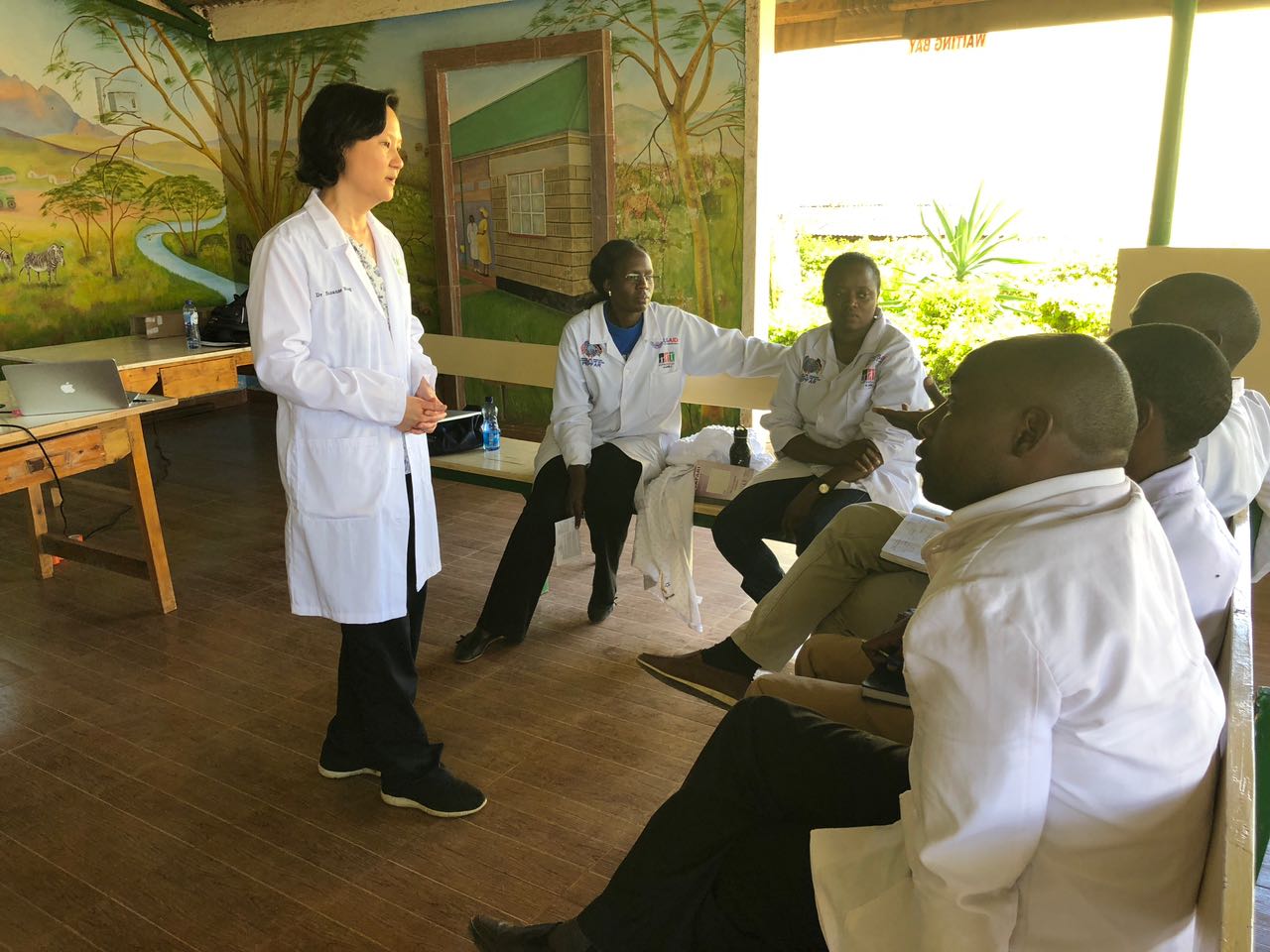Jambo!
Our second full day began with a beautiful breakfast served by the lovely staff and lots of laughs at the table. I must say I feel so grateful to be a part of this amazing group. Smart, funny and passionate about our mission of improving health care for this community. They work really hard and encounter stressful situations and yet always keep smiling through it all. It is truly inspirational.
Dr. Sue leads Naweza's longest ever CME to a rapt audience. There were many questions on gestational diabetes, hypertension in pregnancy and contraceptives, STIs and infertility.
After breakfast, Dr. Sue led her CME on gestational diabetes, hypertension in pregnancy and contraceptives, STIs and infertility. It was a full house, including Emily, our Community Health Worker, (and how could I not mention little Leon again). Dr. Sue spoke for 3 hours with no break (a Naweza record). The staff was especially curious about STIs and infertility asking many questions about their current and past cases. It was highly interactive and I think very helpful to them.
Vanessa, Michael and myself met with Phoebe the clinic manager to review the M-Health Study. One of our goals on the trip is to ensure the screening process is running properly and that they are enrolling the right patients, prescribing the correct drugs, at the right time, etc. We’ve identified a couple of areas that need clarification, but for the most part we are pleased with the process.
The M-Health Study at this point is comprised of two studies, which both screen the community for their risk of a cardiac event caused by chronic disease in the next 10 years. The first study, Afya Chat 1 (Afya means “health” in Swahili) asks 5 questions about the patient:
- gender
- tobacco use
- age
- blood pressure
- and if you are diabetic.
The second study, Afya Chat 2, asks the same questions except ... instead of stating 'Yes' or 'No' if you’re diabetic, Emily (our community health worker) takes their blood sugar level and inputs this number into the software program. We want to see if the number of patients who are at risk increases if we add this level of accuracy to the data input.
Emily has screened 672 patients and in order to ensure a valid sample size; our goal is 1192. We're over halfway there!
She will finish later this year at which point we will stop the screening process and focus on follow-up and management of those patients through our EMR system. So far we have identified 13 people or 1.9% of the people screened as requiring treatment. At this rate we will have just under 30 patients who will be treated for chronic disease who before the screening had no idea that they were at risk.
Dr. James and members of the Lewa clinic consult in between patients
Michael, James and I also had the opportunity to meet with Dr. Butt, the doctor who volunteers at Lewa every 2 weeks. In fact he has volunteered every two weeks for the last 14 years! We had met him back in 2013 on our first trip here at the clinic. Today we learned from him that muscular skeletal and nutrition are two areas that he thought the community could benefit from. A few years back, professionals in these very fields joined the Medcan Naweza trip -- a chiropractor (read Chiropractor Andy Miners' 2015 blog entry here), a fitness trainer (Rob Turner) and registered dietitian (Alex Friel) and found their contributions to be very well received by the community. Many of the people here do hard farm labour and their tools are not ergonomic, leading to many injuries and strained joints and muscles. Providing education around exercises and stretches to minimize injury and muscle strain are the best alternative to medication in this resource limited area. In fact, it’s the best alternative anywhere you might live!
After lunch back at Ngiri House we returned to the clinic for an afternoon of seeing patients. I sat in with Dr. Michael, who saw children. We had a variety of issues including nephrotic syndrome; pitting edema in a three-month old; and three patients with fungal concerns and various respiratory illnesses. Dr. Michael again uses an interactive style of teaching with the nurse who is also acting as his translator. He takes his time with each patient, posing questions and different scenarios to the nurse in order to maximize the learning opportunity.
Indoors, Dr. Sidiqa examines patients' eyesight and discusses the Community Health Worker screening program
Dr. Sidiqa saw optometry patients who complained of red and itchy eyes, required reading glasses and prescription glasses. She worked with Lydia, Lewa’s head of optometry and continued to provide training and education. Dr. Sidiqa is trying to prepare her for the vision clinics that she will be running at the schools whereby she will screen the student’s visual acuity and will refer them to the clinic if they require glasses. Naweza will sponsor these clinics and pay for any prescription glasses that are required.
When the rain stops, Lydia leads eye examinations outdoors.
School children take turns testing their vision with Lydia, Lewa's Head of Optometry
Tomorrow will be a full day of meetings with the team as we prepare our strategy and presentation for when we meet with the CEO of Lewa on Tuesday. It will be a day of number crunching, modeling and lots of discussion of what we’ve learned and how we believe Naweza can continue to add value to the Lewa Community.
Now it’s time for dinner with the team. It’s one of our favourite times of the day as we get to share stories and photos of all of the memorable moments. And there are many as you can’t help but be touched by all of the encounters the day brings you in this beautiful part of the world.
That’s all for now. Thanks for reading! :)
Stacy





